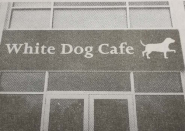When I opened my closet door this morning, I saw a sign that says, “Good morning, beautiful business.” It’s a reminder to me of just how beautiful business can be when we put all our creativity, energy, and care into producing one product or service in exchange for another. Economic exchange can be one of the most meaningful and beautiful interactions among human beings.

Over the past years since I started the White Dog Café, my business has not only provided me with a way of making a living and a way of serving others but also been my teacher. In reading Small Is Beautiful I realized that so much of what my business has taught me can be found in the great lessons of E.F. Schumacher: it is of great benefit to keep your business focusing on the needs of workers rather than only on what they produce; you’d better use a management style that balances freedom and order; you should build sustainable local economies and respect the land and nature. The effects of industrialization that worried Schumacher decades ago have gotten even worse: namely, wealth inequality and the growing degradation (退化) of our environment.
Today much of what I care about ---nature, animals, communities, family farms, family businesses, native cultures, the character of our towns and cities, even our children’s future---is being threatened by corporate globalization. To protect all that I care deeply about, I need to step out of my own company, out of the White Dog Café. I started my journey with the simple idea that a sustainable global economy must be compromised of sustainable local economies. Rather than a global economy controlled by large international corporations, our movement advocates a global economy with a network of local economies made up of small independent businesses that create community wealth while working in harmony with natural system.
I opened the White Dog Café in 1983 on the first floor of my house in a neighborhood of Philadelphia. It is the house I have lived in since I was a child. Today much of the food I serve at the White Dog Café comes from the same land where my ancestors once farmed. When I opened the café years ago, it was a simple coffee and cake take-away shop serving students who lived nearby. Over the years we have expanded our menu and grown to occupy five buildings. We now employ more 100 people, can seat more than two hundred customers, and earn over $5 million a year! I owe our success to making decisions not for the purpose of maximizing profits but instead maximizing the relationships with our customers and staff, with our community, with our suppliers and with our natural environment.
Now I still live above the shop. I still have the old-fashioned way of doing business---the way it was in the old days with the family farm, the family inn, and the corner store. Living and working in the same community has given me a stronger sense of place and a different business outlook. When I make a business decision, it comes naturally for my decision to be made in the common interest of all involved because every day I see the people affected by my decision---my neighbours, my customers, and my employees as well as the natural world. There is a short distance between the business decision-maker and those affected by the decision. I believe that when we are surrounded by those affected by our decisions, we are more likely to make a decision from the heart as opposed to the head.
Business schools teach “grow or die”. But I make a conscious decision to continue to be a small business because I know that when we grow in physical size, we give up something very important ---authentic relationships with the people around us and those we do business with. I have come to realize that we can measure our success by measuring how much we improve our knowledge, deepen our relationships, achieve happiness, and have more fun.
1.What do we know about the sign on the author’s closet door?
A.It has been her family motto for years.
B.It serves as an inspiration to her.
C.It comes from one of her favourite book.
D.It helps her forget difficulties in business.
2.What is one drawback of corporate globalization according to the author?
A.The high cost. B.Small profits.
C.Poor management. D.Damage to the environment.
3.What did the author do when facing the threat of corporate globalization?
A.She worked together with other independent businesses.
B.She fought against the global economy in her community.
C.She expanded her own business at home and abroad.
D.She learned from large international corporations.
4.What is the secret behind the success of the White Dog Café?
A.It always has regular customers.
B.It has been run as a family business.
C.It gets along well with the people involved.
D.It makes big profits by developing fast.
5.Why does the author choose to live and work in the same community?
A.She wants to stay close to her family.
B.She can learn about others’ opinions easily.
C.Food in her café can be served immediately.
D.Neighbors can be her customers or employees.
6.What does the underlined sentence in the last paragraph imply?
A.We usually learn how to do business in business school.
B.Business schools focus on the basic principles of business.
C.We tend to measure success in business by constant growth.
D.Business schools teach when to expand or leave the business.
高三英语阅读理解困难题